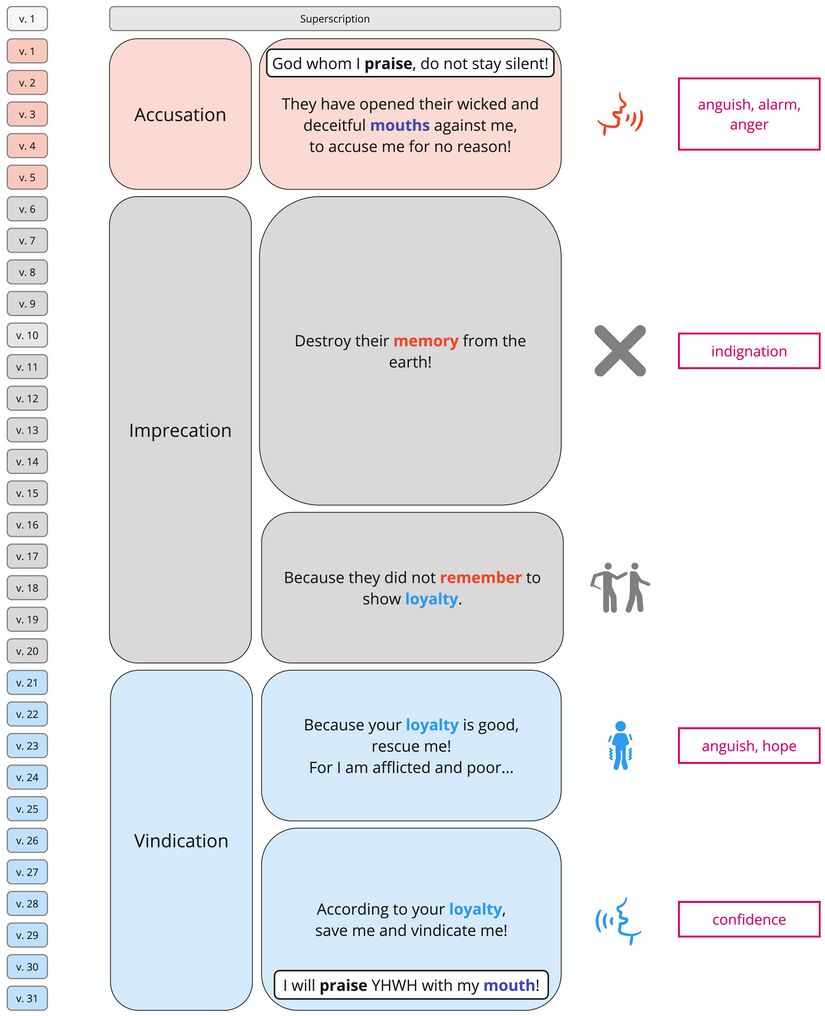Psalm 109: Difference between revisions
From Psalms: Layer by Layer
Amanda.Jarus (talk | contribs) No edit summary |
Amanda.Jarus (talk | contribs) No edit summary |
||
| Line 1: | Line 1: | ||
{{Overview | |||
|Chapter=109 | |||
|Memorable Phrase=May his days be few! | |||
|Memorable Icon=Psalm 109 - Icon.jpg | |||
|Purpose=To appeal to YHWH’s loyalty to bring justice on disloyalty. | |||
|Content=My enemies have broken their covenant with me (vv. 2-5, 16-20) and I am innocent and afflicted (vv. 2-15, 22-25. And you are loyal in your covenant with me (vv. 21, 26). Therefore, YHWH, execute justice by punishing my enemies (vv. 6-20) and vindicating me (vv. 21-31)! | |||
|Message=YHWH remains loyal to his covenant even when humans are disloyal to their own. | |||
|Author=[[Author::David]] | |||
|Background Ideas=<ul><li>A covenant is a relationship between two parties, solemnized by oaths and based on "loyalty" (חֶסֶד). When making a covenant, the two parties would invoke curses (קְלָלָוֹת) on themselves in the case of their failure to be loyal (see e.g., Deut 27-28).</li> | |||
<li>Oftentimes, these curses included the extinction of one's family line, which is the worst possible thing that can happen to someone. (See e.g., an 8th century Aramaic treaty: COS 2.82; Hittite treaties: COS 2.17A; cf. COS 2.17B; COS 2.18; the Vassal Treaties of Esarhaddon, ANET 534-41.)</li> | <li>Oftentimes, these curses included the extinction of one's family line, which is the worst possible thing that can happen to someone. (See e.g., an 8th century Aramaic treaty: COS 2.82; Hittite treaties: COS 2.17A; cf. COS 2.17B; COS 2.18; the Vassal Treaties of Esarhaddon, ANET 534-41.)</li> | ||
<li>The making of a covenant and the invoking of covenant oaths/curses were often accompanied by rituals to solemnize the event and symbolize the nature of the curses (cf. Gen 15; Jer 32:18; COS 2.82). It appears that putting on clothes, drinking water or beer, and rubbing oil on oneself (see Ps 109:18) sometimes had a part in oath-taking ceremonies (cf. Vassal treaties of Esarhaddon, ANET, lines 560-562, 622-624; Hittite text, KUB 26.25, ca. 1200-1180, cited in Kitz 2007, 446-447; Num 5:21-22).</li> | <li>The making of a covenant and the invoking of covenant oaths/curses were often accompanied by rituals to solemnize the event and symbolize the nature of the curses (cf. Gen 15; Jer 32:18; COS 2.82). It appears that putting on clothes, drinking water or beer, and rubbing oil on oneself (see Ps 109:18) sometimes had a part in oath-taking ceremonies (cf. Vassal treaties of Esarhaddon, ANET, lines 560-562, 622-624; Hittite text, KUB 26.25, ca. 1200-1180, cited in Kitz 2007, 446-447; Num 5:21-22).</li> | ||
<li>People who are falsely accused of something, including the violation of a covenant, can take their case to a judge (cf. Deut 25:1).</li> | <li>People who are falsely accused of something, including the violation of a covenant, can take their case to a judge (cf. Deut 25:1).</li> | ||
<li>Because YHWH is "the judge of all of the earth" (Gen 18:25), those who are innocent yet falsely accused and/or falsely convicted can appeal to him for vindication (cf. Pss 5, 7, 17, 35, etc.).</li></ul> | <li>Because YHWH is "the judge of all of the earth" (Gen 18:25), those who are innocent yet falsely accused and/or falsely convicted can appeal to him for vindication (cf. Pss 5, 7, 17, 35, etc.).</li></ul> | ||
|Verse Count=31 | |||
|Guardian=Ryan Sikes | |||
}} | |||
{{PsalmVideos | |||
|Exegetical Issues Video=SIcw9BnfqAg | |||
}} | |||
{{Summary Images | |||
|At A Glance=Psalm 109 - At a glancy Ps 109.jpg | |||
|Background Situation=Psalm 109 - Background situation.jpg | |||
|Speech Act Summary=Psalm 109 - Speech act.jpg | |||
|Emotional Analysis Summary=Psalm 109 - Think-feel-do.jpg | |||
|Participant Analysis Summary=Psalm 109 - PA Relations Diagram.jpg | |||
|Repeated Roots Summary=Psalm 109 - Repeated Roots Summary.jpg | |||
|Story Behind Summary=Ps 109 - summary triangle.jpg | |||
}} | |||
=Overview= | |||
[[File:Psalm 109 - At a glancy Ps 109.jpg|class=img-fluid|825px]] | [[File:Psalm 109 - At a glancy Ps 109.jpg|class=img-fluid|825px]] | ||
| Line 120: | Line 133: | ||
</div> | </div> | ||
=Verse-by-Verse= | =Verse-by-Verse= | ||
Revision as of 20:02, 31 December 2024
Purpose: To appeal to YHWH’s loyalty to bring justice on disloyalty.
Content: My enemies have broken their covenant with me (vv. 2-5, 16-20) and I am innocent and afflicted (vv. 2-15, 22-25. And you are loyal in your covenant with me (vv. 21, 26). Therefore, YHWH, execute justice by punishing my enemies (vv. 6-20) and vindicating me (vv. 21-31)!
Message: YHWH remains loyal to his covenant even when humans are disloyal to their own.
Author: David
Videos
Overview Video
Video forthcoming
Poetic Features Video
Video forthcoming
Exegetical Issues Video
Overview
Translation
Click 'Expand' to the right to see our Close-but-Clear translation of Psalm 109.
Verse-by-Verse
Click the link to view all of Psalm 109 Verse-by-Verse, or click on an individual verse below.
- v. 1
- v. 2
- v. 3
- v. 4
- v. 5
- v. 6
- v. 7
- v. 8
- v. 9
- v. 10
- v. 11
- v. 12
- v. 13
- v. 14
- v. 15
- v. 16
- v. 17
- v. 18
- v. 19
- v. 20
- v. 21
- v. 22
- v. 23
- v. 24
- v. 25
- v. 26
- v. 27
- v. 28
- v. 29
- v. 30
- v. 31
Layer-by-Layer
Exegetical Issues
Guardian: Ryan Sikes
